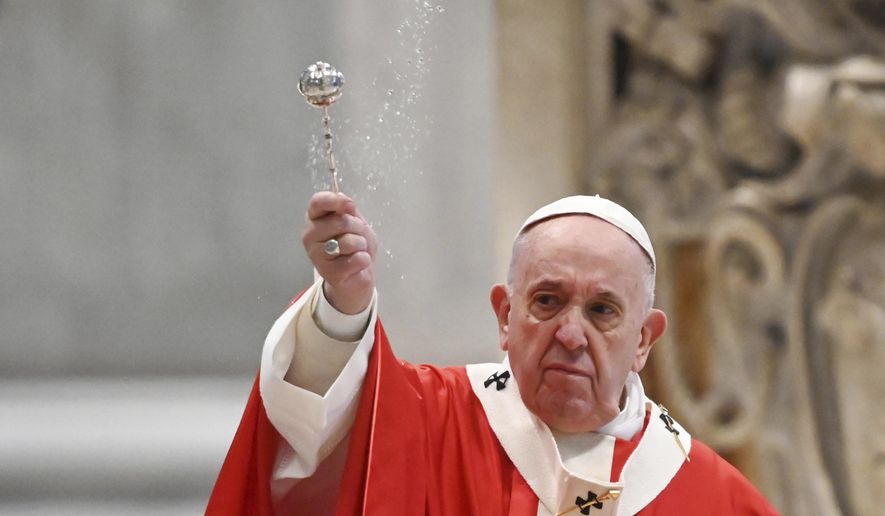Some American Catholics are wary of Pope Francis’ call for a commission to study the idea of female deacons, saying the panel likely will be mostly conservative theologians.
“The deck has really been stacked against [women deacons] with this commission,” said Jamie L. Manson, a columnist with National Catholic Reporter. “I don’t think there’s any voice in this new crop of people who has argued that women deacons can be equal to male deacons.”
In a surprise announcement, Francis on Wednesday set up a 10-member commission to study whether women can serve as deacons — ordained ministers who can baptize, witness marriages and perform funerals. Deacons who are older than 35 can be married, but none can hear confession, anoint the sick or celebrate Mass.
A previous commission, formed at the urging of nuns, disbanded in *June 2018, with Pope Francis telling reporters its members “all had different positions, sometimes sharply different; they worked together and they agreed up to a point.”
The new commission’s five-men, five-women composition might have inspired hope for progressive Catholics wishing to see female ordination.
The Women’s Ordination Conference, a Washington D.C.-based group advocating for “feminist voice for women in the Roman Catholic Church,” said it “welcomes” the commission’s formation.
“Women have been protagonists in the history of our faith since the time of the Gospels, something we are particularly reminded of this Holy Week,” the conference said in a press statement. “We do not need to prove our sacramentality.”
But Ms. Manson noted, “There is not even wiggle room [given the group’s composition] … for real progress for women.”
Phyllis Zagano, a researcher at Hofstra University and the author “Women: Icons of Christ,” also cast doubt on the likelihood of the panel approving female deacons, noting in an email that some of its members opposed the assertion of the late Italian theologian Cipriano Vagaggini that women deacons had been and could be ordained again to fulfill the needs of the church.
“I am not aware of recent or refereed academic work on the topic of women deacons by any of the persons named,” Ms. Zagano said, describing Vagaggini as a “principal scholar” on the matter.
The commission will include academics from Spain, France, Great Britain, Italy, Switzerland and Ukraine, as well as two Americans, including James Keating, a theologian at the Institute for Priestly Formation Creighton University in Omaha, Nebraska.
Mr. Keating has written in defense of traditional marriage and maintaining celibacy in the priesthood. In a 2012 essay for New Diaconal Review, he described the spiritual call to men to become deacons.
“This call took on flesh in Christ, whose Spirit now continues to call to men deep within their consciences and from within the cry of those in need,” wrote Mr. Keating, who is also a deacon in the Archdiocese of Omaha.
The other American, Dominic Cerrato, is a deacon in the Diocese of Steubenville who also has taught theology at Franciscan University. Mr. Cerrato declined an interview request but issued a statement saying his appointment is an “honor and a privilege.”
“I look forward to working with experts in the area in the diaconate from all over the world to serve the Church in this important way,” Mr. Cerrato said.
The debate has risen, again, after a recently concluded gathering of church leaders in Amazonia — on how best to bring communion and sacraments to remote villages of practicing Catholics in the Amazon basin — recommended more study of the possibility of ordaining women as deacons. (Pope Francis had declined to take up a more controversial recommendation of the synod, to allow married men who are permanent deacons to be ordained as priests in extreme situations.)
The previous commission’s report on women deacons was given to the pope, and Francis delivered portions of that report in May 2019 to the International Union of Superiors General, according to news reports. However, the report has not been made public.
While in 1994, Pope John Paul II said, “the Church had no authority whatsoever” to ordain women as priests, the question on female roles in the early Church remain contentious. In a 2004 essay in Church History, researcher Valerie A. Karras wrote, “The evidence for ordained female deacons in the early Christian period, at least in portions of the Eastern Church, is clear and unambiguous.”
* (Correction: An updated version of this story corrected the date of when a previous commission disbanded.)
• Christopher Vondracek can be reached at cvondracek@washingtontimes.com.




Please read our comment policy before commenting.